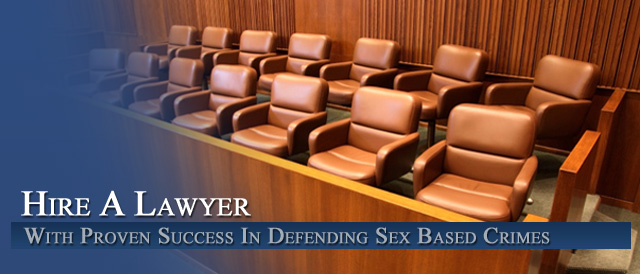




The Colorado Crime Of Sexual Exploitation Of Children – C.R.S. 18-6-403
The 2012 Change In The Sentencing Law C.R.S. 18-6-403 – Sexual Exploitation of a Child
By Colorado Sex Crimes Criminal Defense Lawyer for the defense of Sexual Exploitation Charges – H. Michael Steinberg
The Colorado Crime Of Sexual Exploitation Of Children – C.R.S. 18-6-403 – was examined a the recent Colorado Court of Appeals case of People v. Jenkins decided on May 23, 2013. The Jenkin’s court explained the old law under the Sex Offender Lifetime Supervision Act (SOLSA) and the impact of the 2012 change in the law which removed this crime from the mandatory and discretionary indeterminate lifetime probation or prison sentences..
But then the Court agreed with the use of a life sentence by the judge using a very different – and dangerous theory of the another Colorado law – adding an unexpected twist at the end of the decision which may send the wrong message to Colorado judges.
In Jenkins – the court sentenced the defendant to an indeterminate term of ten years to life of sex offender-specific probation. The Defendant appealed arguing his sentence for Sexual Exploitation of a Child. He had pleaded guilty to one count of sexual exploitation of a child, which was a class 4 felony.
Sentencing In Colorado For The Crime Of Sexual Exploitation Of A Child Is Complex – C.R.S. 18-6-403
The Colorado Crime Of Sexual Exploitation Of Children – C.R.S. 18-6-40 as interpreted by the Colorado Sex Offender Lifetime Supervision Act (SOLSA) is complex. The SOLSA provides – under §18-1.3-1003(4) for possible indeterminate sentencing for certain sex crimes listed under that law.
This law provides that Sexual Exploitation Of A Child – C.R.S. 18-6-403 is NOT one of the crimes for which you can receive an indeterminate sentence – both then – when the case was decided – and now – since the law was changed in 2012.
Jenkins also did not meet the sexually violent predator definition and therefore – because the defendant did not meet either of the relevant definitions of a sex offender in SOLSA, he could not be sentenced to probation “for an indeterminate period of at least ten years . . . and a maximum of [his] natural life” under subsection 1004(2)(a). CRS § 18-1.3-1007(1)(a).
As the Court explained in Jenkins:
“Colorado’s sex offender sentencing matrix creates an intensive supervision probation program for two classes of persons who have been sentenced to probation. One class includes sex offenders who are sentenced to probation under the Colorado SOLSA. The second class includes persons who are not sex offenders under SOLSA, such as Jenkins, who have committed a sex-related offense but are not sentenced to probation under SOLSA.
The Issue That Is Concerning In This Case – Sentencing Authority And The Crime Of Sexual Exploitation C.R.S. 18-6-403
How far can a Court go? What is the sentencing authority of a Judge? The question about the outer reaches of the sentencing authority of a court in a Colorado criminal case – was this
“ Can the court sentence a defendant who has been convicted of a felony to an indeterminate probationary term of ten years to life, even if the defendant is not a sex offender who has been convicted of a sex offense subject to sentencing under the Sex Offender Lifetime Supervision Act (SOLSA)?”
The Court concluded YES.
When the lower court judge sentenced Jenkins to an indeterminate sentence of life in prison – it found that the “trial court did not impose an illegal probationary term when it sentenced defendant”, and properly denied the defendant’s Crim. P. 35(a) motion.
The Appellate Court’s Reasoning
When this defendant pled guilty to sexual exploitation of a child, a class four felony and the court sentenced him to an indeterminate term of ten years to life – sex offender specific probation.
Apparently relying on section 18-1.3-1004(2)(a), C.R.S. 2012 (subsection 1004(2)(a)), the prosecution argued that, because defendant was a sex offender, the court was authorized to sentence him to an indeterminate probation sentence from ten years to life.
Subsection 1004(2)(a) – Of The SOLSA
The lifetime supervision scheme for sex offenders who meet its definitions. § 18-1.3-1001, C.R.S. means that Colorado sex offenders may receive treatment and supervision for the rest of their lives, if necessary, is necessary for the safety, health, and welfare of the state.
The SOLSA’s indeterminate sentencing scheme appears in section 18-1.3-1004(1)(a), C.R.S. This statute states that courts shall sentence sex offenders to prison “for an indeterminate term of at least the minimum of the presumptive range specified in section 18-1.3-401 for the level of offense committed and a maximum of the sex offender’s natural life.”
The Colorado Crime Of Sexual Exploitation Of Children – C.R.S. 18-6-403 – Important Sex Offenses Definitions – Included In The Law – § 18-1.3-1003
… A “Sex offender” means a person who is convicted of or pleads guilty or nolo contendere to a sex offense.
… A “Sex offense” means any of the following offenses: (I) (A) Sexual assault, as described in section 18-3-402;
or
(B) Sexual assault in the first degree, as described in section 18-3-402 as it existed prior to July 1, 2000;
(II) Sexual assault in the second degree, as described in section 18-3-403 as it existed prior to July 1, 2000;
(III) (A) Felony unlawful sexual contact, as described in section 18-3-404(2);
(B) Felony sexual assault in the third degree, as described in section 18-3-404(2) as it existed prior to July 1, 2000;
(IV) Sexual assault on a child, as described in section 18-3-405;
(V) Sexual assault on a child by one in a position of trust, as described in section 18-3-405.3;
(VI) Aggravated sexual assault on a client by a psychotherapist, as described in section 18-3-405.5(1);
(VII) Enticement of a child, as described in section 18-3-305;
(VIII) Incest, as described in section 18-6-301;
(IX) Aggravated incest, as described in section 18-6-302;
(X) Patronizing a prostituted child, as described in section 18-7-406;
(XI) Class 4 felony internet luring of a child, in violation of section 18-3-306(3);
or
(XII) Internet sexual exploitation of a child, in violation of section 18-3-405.4;
[“Sex offense” also includes criminal attempt, conspiracy, or solicitation to commit any of the offenses specified in paragraph (a) of this subsection (5) if such criminal attempt, conspiracy, or solicitation would constitute a class 2, 3, or 4 felony.]
Sexual Exploitation Of A Child Is NOT Listed In These Definitions
Therefore the defendant is a “sex offender” who could NOT be sentenced to probation under subsection 1004(a)(2)….sexual exploitation of a child under section 18-6-403, C.R.S. 2012 — does not appear in this list.
In 2012 the other possibility for a life sentence was a section (4) of the law (18-1.3-1004(4)) but that section was removed – repealed in 2012 – It used to say “ [s]ex offender also means any person sentenced as a sex offender pursuant to section 18-1.3-1004(4).” but that language was deleted by legislative amendment in June 2012. Ch. 268, sec. 23, 2012 Colo. Sess. Laws 1402.
The Requirement Of Sex Offender Intensive Supervision Probation – Section 18- 1.3-1007(1)(a), C.R.S.
The SOLSA established the creation of an intensive supervision probation program for Colorado sex offenders sentenced to probation. The law requires persons, as a condition of probation, to participate in the intensive supervision probation program established pursuant to this section if the person is convicted of one of the following offenses and sentenced to probation.
(9) “Unlawful sexual behavior” means any of the following offenses or criminal attempt, conspiracy, or solicitation to commit any of the following offenses:
(a) (I) Sexual assault, in violation of section 18-3-402, C.R.S.; or
(II) Sexual assault in the first degree, in violation of section 18-3-402, C.R.S., as it existed prior to July 1, 2000;
(b) Sexual assault in the second degree, in violation of section 18-3-403, C.R.S., as it existed prior to July 1, 2000;
(c) (I) Unlawful sexual contact, in violation of section 18-3-404, C.R.S.; or
(II) Sexual assault in the third degree, in violation of section 18-3-404, C.R.S., as it existed prior to July 1, 2000;
(d) Sexual assault on a child, in violation of section 18-3-405, C.R.S.;
(e) Sexual assault on a child by one in a position of trust, in violation of section 18-3-405.3, C.R.S.;
(f) Sexual assault on a client by a psychotherapist, in violation of section 18-3-405.5, C.R.S.;
(g) Enticement of a child, in violation of section 18-3-305, C.R.S.;
(h) Incest, in violation of section 18-6-301, C.R.S.;
(i) Aggravated incest, in violation of section 18-6-302, C.R.S.;
(j) Trafficking in children, in violation of section 18-3-502, C.R.S.;
(k) Sexual exploitation of children, in violation of section 18-6-403, C.R.S.;
(l) Procurement of a child for sexual exploitation, in violation of section 18-6-404, C.R.S.;
(m) Indecent exposure, in violation of section 18-7-302, C.R.S.;
(n) Soliciting for child prostitution, in violation of section 18-7-402, C.R.S.;
(o) Pandering of a child, in violation of section 18-7-403, C.R.S.;
(p) Procurement of a child, in violation of section 18-7-403.5, C.R.S.;
(q) Keeping a place of child prostitution, in violation of section 18-7-404, C.R.S.;
(r) Pimping of a child, in violation of section 18-7-405, C.R.S.;
(s) Inducement of child prostitution, in violation of section 18-7-405.5, C.R.S.;
(t) Patronizing a prostituted child, in violation of section 18-7-406, C.R.S.;
(u) Engaging in sexual conduct in a correctional institution, in violation of section 18-7-701, C.R.S.;
(v) Wholesale promotion of obscenity to a minor, in violation of section 18-7-102 (1.5), C.R.S.;
(w) Promotion of obscenity to a minor, in violation of section 18-7-102 (2.5), C.R.S.;
(x) Class 4 felony internet luring of a child, in violation of section 18-3-306 (3), C.R.S.;
(y) Internet sexual exploitation of a child, in violation of section 18-3-405.4, C.R.S.;
(z) Public indecency, committed in violation of section 18-7-301 (2) (b), C.R.S., if a second offense is committed within five years of the previous offense or a third or subsequent offense is committed;
(aa) Invasion of privacy for sexual gratification, in violation of section 18-3-405.6, C.R.S.; or
(bb) Second degree kidnapping, if committed in violation of section 18-3-302 (3) (a), C.R.S.
Therefore – Colorado law creates “two classes” of persons who must be sentenced to sex offender intensive supervision probation. One class includes sex offenders who are sentenced to probation under SOLSA and a second class includes persons who are not sex offenders under the – but who have committed a sex-related offense, but may not be sentenced to probation under the SOLSA.
The PROBATIONARY POWER Of Colorado Judges – § 18-1.3-202(1)
This is where is gets dicey. Having found that the yhe Colorado Sex Offender Lifetime Supervision Act does not provide the authority for an indeterminate probation based life sentence, the Court of Appeals turned to the Colorado law – § 18-1.3-202(1) which defines the probationary power that courts have.
Here is what this law says:
“When it appears to the satisfaction of the court that the ends of justice and the best interest of the public, as well as the defendant, will be served thereby, the court may grant the defendant probation for such period and upon such terms and conditions as it deems best. The length of probation shall be subject to the discretion of the court and may exceed the maximum period of incarceration authorized for the classification of the offense of which the defendant is convicted but shall not exceed five years for any misdemeanor or petty offense.” § 18-1.3-202(1)
The Court ruled that subsection 202(1), permits courts to sentence an offender to an indeterminate probationary term of ten years to life. The Court held that this was NOT an illegal sentence.
In Jenkins – the Court of Appeals stated multiple grounds in support of it’s reasons for this enormous power – or broad authority to sentence in this way.
Here are the Court’s primary reasons excerpted. They stated:
“there are sound policy reasons for not limiting a term of probation to the maximum presumptive term of incarceration authorized by statute. Although incarceration is primarily punitive, probation is primarily rehabilitative. There is no reason to believe that the legislature’s judgment concerning an appropriate term of punishment by imprisonment was intended to fix, or is even related to, the term of probation that may be required to rehabilitate the offender. There may be many cases in which the goals of probation simply cannot be achieved within the time constraints the legislature has placed on imprisonment.”
…“the maximum sentence [to imprisonment] in the aggravated range . . . does not establish the maximum period of probation to which a defendant may be sentenced…
…the plain language of subsection 202(1) contemplates the possibility of an indeterminate term of probation. It authorizes the court to grant probation for “such period . . . as it deems best.
..subsection 202(1) does not expressly refer to determinate or indeterminate terms of probation. The absence of such a distinction indicates that the legislature has not eliminated either option from the trial court’s consideration.”
.. the legislature clearly understands the difference between determinate and indeterminate sentencing. (and) …a determination of the length of probation is only governed by the statutes concerning probation, and not by the statutes concerning sentences to imprisonment.”
… the policy considerations underpinning probation support a court’s authority to impose an indeterminate sentence. Probation focuses on rehabilitation..and an indeterminate probationary term may be necessary in certain instances to achieve rehabilitative goals for certain offenders.
… a court retains discretion to determine when an offender who has been sentenced to an indeterminate term can be terminated from probation. While the probation statute does not specify when a trial court’s authority over a probationer terminates,…a court may for good cause shown and after notice to the defendant, the district attorney, and the probation officer, and after a hearing if the defendant or the district attorney requests it, . . . reduce or increase the term of probation.
The Colorado Crime Of Sexual Exploitation Of Children – C.R.S. 18-6-403
Denver Colorado Criminal Defense Lawyer
The Law Offices of H. Michael Steinberg, in Denver, Colorado, provide criminal defense clients with effective, efficient, intelligent and strong legal advocacy. We can educate you and help you navigate the stressful and complex legal process related to your criminal defense issue.
H. Michael Steinberg, is a Denver, Colorado criminal defense lawyer who will provide you with a free initial case consultation to evaluate your legal issues and to answer your questions with an honest assessment of your options.
Helping Clients To Make Informed Decisions In the Defense of Colorado Criminal Cases.
Colorado Defense Lawyer H. Michael Steinberg provides solid criminal defenses for clients throughout the Front Range of Colorado – including the City and County courts of Adams County, Arapahoe County, City and County of Boulder, City and County of Broomfield, City and County of Denver, Douglas County, El Paso County – Colorado Springs, Gilpin County, Jefferson County, Larimer County, and Weld County,…. and all the other cities and counties of Colorado along the I-25 Corridor… on cases involving ...the Colorado Crime Of Sexual Exploitation Of Children – C.R.S. 18-6-403.
Other Articles of Interest:
- Colorado Sex Crimes: Understanding The Colorado Sex Offender Lifetime Supervision Act – Indeterminate Sentencing
- Colorado Criminal Sex Crimes Law – Understanding How a Charge of Sexual Exploitation Can Turn Into A Life Sentence – The Sexually Violent Predator
- Colorado Sex Crimes Law – Analysis of Sexual Exploitation Cases– How These Cases Can Quickly Turn Into Life Sentences
- 18-1.3-1004. Indeterminate Sentences – Colorado Sex Offender Sentencing Law
- Colorado Criminal Sex Crimes Law – FAQ – Can A Colorado Sex Offender Transfer Probation to Another State Under the Colorado Lifetime Treatment of Sex Offenders Act?













